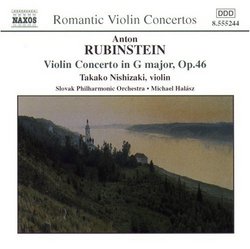| All Artists: Anton Rubinstein, Cesar Cui, Michael Halasz, Kenneth Schermerhorn, Slovak Philharmonic Orchestra, Hong Kong Philharmonic Orchestra Title: Rubinstein: Violin Concerto in G major, Op. 46 Members Wishing: 0 Total Copies: 0 Label: Naxos Release Date: 4/17/2001 Genre: Classical Styles: Chamber Music, Forms & Genres, Concertos, Historical Periods, Classical (c.1770-1830), Instruments, Strings Number of Discs: 1 SwapaCD Credits: 1 UPC: 747313524426 |
Search - Anton Rubinstein, Cesar Cui, Michael Halasz :: Rubinstein: Violin Concerto in G major, Op. 46
 | Anton Rubinstein, Cesar Cui, Michael Halasz Rubinstein: Violin Concerto in G major, Op. 46 Genre: Classical
|
Larger Image |
CD Details |
CD ReviewsAesthetically Pleasing Recording of Rare Romantic Works for Leslie Richford | Selsingen, Lower Saxony | 01/20/2008 (4 out of 5 stars) "1. Anton Rubinstein (1829 - 1894): Violin Concerto in G major, Op. 46 (composed in 1857). Performed by Takako Nishizaki, violin, and the Slovak Philharmonic Orchestra, directed by Michael Halász. Recorded at the Reduta Hall in Bratislava, Slovakia, in July 1985. Playing time 37'27".
2. César Cui (1835 - 1918): Suite Concertante for Violin and Orchestra, Op. 25 (composed in 1884). Performed by Takako Nishizaki, violin, and the Hong Kong Philharmonic Orchestra, directed by Kenneth Schermerhorn. Recorded at the Tsuen Wan Town Hall, Hong Kong, in October 1984. Playing time: 21'08". This compilation published in 2001 as Naxos 8.555244. As a fan of the music of earlier centuries, it is only occasionally that I make an excursion into the field of the late 19th century violin repertoire. But even I am slowly becoming inured to the charms of the violin concertos by Beethoven, Mendelssohn, Brahms, Bruch and Tchaikovsky so often heard and recorded. So it was a remarkably pleasant and aesthetically enjoyable experience to listen to this Naxos compilation containing two relatively rare works which were originally released on the Marco Polo label and had been unavailable for some time before they were recycled on Naxos at the usual incredibly low price. Takako Nishizaki, wife of label founder Klaus Heymann, often combines consummate violin-playing skills with a certain Japanese discipline and emotional reticence, but on this CD I felt that this was just right. Perhaps also the fact that the engineering was rather better than on some of her later Naxos releases made listening to this a delightful experience. The Rubinstein Concerto is in the German style, falling somewhere between Mendelssohn and Brahms, but somehow lacking the popular elements that made the Concertos by those giants so all-pervasive. However, if you listen to the Rubinstein carefully, you will find both attractive melodies and sequences which betray the Russian background. The Slovak Philharmonic (and not the State Philharmonic of Kosice, as the booklet wrongly indicates) is a great partner for Nishizaki here, and conductor Michael Halász seems to lead the orchestra through all the pitfalls with both zest and confidence. The engineering puts Ms Nishizaki firmly in the foreground, but the orchestra still manages to play its part extremely well. César Cui, as the son of a Frenchman and a Lithuanian woman, did not seem predestinated to become a Russian nationalist composer, but as a member of Balakirev's "Mighty Handful" that is, in fact, what he did become. His works today are overshadowed by those of Mussorgsky, Borodin and Rimsky-Korsakov, and it is symptomatic that even on Naxos, that broadest of repertoire labels, there are only three CDs available with works by Cui: this one, in combination with Rubinstein's Violin Concerto; a CD of piano pieces; and an isolated "tarantelle" on the Italian Festival CD compilation. Listening to Cui's "Suite Concertante" out of context, so to speak, was much more difficult than listening to the smooth and pleasing Rubinstein concerto, but I found that after a couple of intense listening sessions, Cui's aggressively Russian style began to take on a logic of its own, a logic that was accompanied by considerable pleasure at the various melodies and orchestral combinations that the composer wove together within a relatively short space. The Hong Kong Philharmonic, directed by the late Kenneth Schermerhorn, did really well on this recording, and I nowhere found myself desiring a European orchestra. Although the violin is a solo instrument here, too, the solo part blends in well with the orchestra, and the balance of the recording is excellent. Perhaps I can conclude by quoting a professional critic, who wrote of this recording: "[Both concertos] sound as fresh and vital as they did back then ... here's a well-schooled performance, full of agreeable touches of imagination (the Andante shows Nishizaki's fine-spun tone to particularly good effect) delivered with crisply economical urgency that makes good musical sense". If you are interested in this repertoire, then I hope this whets your appetite enough to take the tiny risk involved in buying this CD." |

 Track Listings (7) - Disc #1
Track Listings (7) - Disc #1